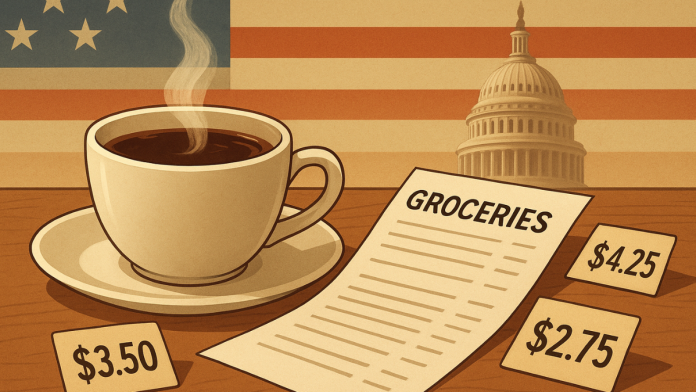Coffee, one of America’s favourite morning essentials, is becoming more expensive. The U.S. Bureau of Labour Statistics recently reported that the country’s price index jumped by 18.9% in September, compared to the same month last year. This steep rise has made coffee a major driver of overall grocery inflation, putting extra strain on household budgets already affected by rising food and energy prices.
From diners and cafés to home kitchens, people are feeling the pinch. Many consumers have noticed higher prices on store shelves, smaller package sizes, and fewer discounts. For millions who start their day with a cup of coffee, these increases are hard to ignore.
In response, President Donald Trump announced plans to reduce tariffs on coffee imports, saying the move is part of his broader effort to make groceries more affordable. Trump said, “We’re going to lower some tariffs. We’re going to have some coffee come in. We’re going to take care of all this stuff very quickly, very easily.”
Coffee tariffs and their impact on prices
The United States imports the vast majority of its coffee, with beans primarily coming from countries in South America, Central America, and Africa. When tariffs are imposed on these imports, it increases the cost for U.S. importers, roasters, and ultimately, consumers.
Reducing these tariffs could make imported coffee cheaper and help bring down prices in supermarkets, cafes, and restaurants. This could also relieve pressure on small businesses, especially cafés that have faced shrinking margins due to higher wholesale costs.
The move is also seen as part of a broader strategy to address consumer frustration over rising living costs. While energy and housing expenses continue to climb, food items like coffee, eggs, and bread have become symbols of economic pressure on middle-class families.
For the White House, tackling something as everyday as coffee prices sends a powerful message: it connects directly to people’s morning routines and wallets.
SCOTUS delivers tense rebuke over Trump’s emergency tariff powers
Every day, groceries feel the heat of inflation.
Coffee is not the only breakfast staple affected by inflation. Prices of milk, cereals, and fruit have also seen significant increases over the past year. Rising transportation costs, supply chain disruptions, and changing global trade policies have all contributed to the steady climb in grocery bills.
In recent months, several consumer surveys have shown that Americans are adjusting their habits—buying smaller quantities, switching to store brands, or cutting back on café visits. This shift reflects the wider concern about affordability across income groups.
Government steps in to ease breakfast costs.
The announcement also comes at a time when overall inflation remains a top economic issue. The Bureau of Labour Statistics’ latest data indicates that while price growth has slowed in some categories, essential food and beverage items continue to rise faster than wages in many sectors.
Experts suggest that tariff cuts alone might not fully solve the problem, since global coffee prices depend on multiple factors—such as harvest yields in producing countries, currency fluctuations, and shipping rates. Still, the administration’s move is expected to have at least some short-term effect on stabilising prices and consumer sentiment.
For now, Americans can only hope that their morning coffee will soon cost a little less. With households already adjusting to tighter budgets, any reduction in costs could provide welcome relief.
As one of the most consumed beverages in the U.S., coffee is more than just a drink—it’s part of daily life. Every rise in its price is a reminder of how inflation reaches into even the smallest routines. The government’s decision to act on coffee tariffs shows how deeply the issue of affordability resonates with families across the nation.


